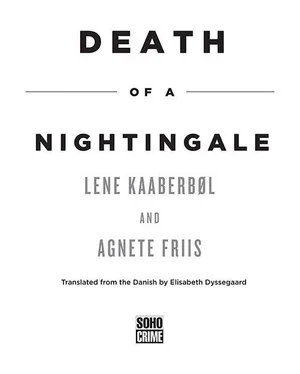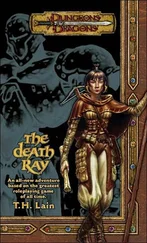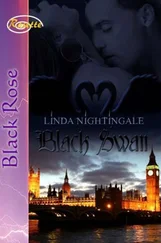Lene Kaaberbol - Death of a Nightingale
Здесь есть возможность читать онлайн «Lene Kaaberbol - Death of a Nightingale» весь текст электронной книги совершенно бесплатно (целиком полную версию без сокращений). В некоторых случаях можно слушать аудио, скачать через торрент в формате fb2 и присутствует краткое содержание. Год выпуска: 2013, ISBN: 2013, Издательство: Soho Crime, Жанр: Старинная литература, на английском языке. Описание произведения, (предисловие) а так же отзывы посетителей доступны на портале библиотеки ЛибКат.
- Название:Death of a Nightingale
- Автор:
- Издательство:Soho Crime
- Жанр:
- Год:2013
- ISBN:1616953047
- Рейтинг книги:5 / 5. Голосов: 1
-
Избранное:Добавить в избранное
- Отзывы:
-
Ваша оценка:
- 100
- 1
- 2
- 3
- 4
- 5
Death of a Nightingale: краткое содержание, описание и аннотация
Предлагаем к чтению аннотацию, описание, краткое содержание или предисловие (зависит от того, что написал сам автор книги «Death of a Nightingale»). Если вы не нашли необходимую информацию о книге — напишите в комментариях, мы постараемся отыскать её.
Death of a Nightingale — читать онлайн бесплатно полную книгу (весь текст) целиком
Ниже представлен текст книги, разбитый по страницам. Система сохранения места последней прочитанной страницы, позволяет с удобством читать онлайн бесплатно книгу «Death of a Nightingale», без необходимости каждый раз заново искать на чём Вы остановились. Поставьте закладку, и сможете в любой момент перейти на страницу, на которой закончили чтение.
Интервал:
Закладка:
Also by Lene Kaaberbøl and Agnete Friis
The Boy in the Suitcase
Invisible Murder

Copyright © 2013 by Lene Kaaberbøl and Agnete Friis
English translation copyright © 2013 Elisabeth Dyssegaard
Published by
Soho Press, Inc.
853 Broadway
New York, NY 10003
Library of Congress Cataloging-in-Publication Data
Kaaberbøl, Lene.
[Nattergalens Doed. English]
Death of a nightingale / Lene Kaaberbøl & Agnete Friis;
Translated from
the Danish by Elisabeth Dyssegaard.
p cm
Originally published as Nattergalens Doed, in Danish.
eISBN: 978-1-61695-305-8
I. Friis, Agnete, author. II. Dyssegaard, Elisabeth Kallick, translator.
III. Title.
PT8177.21.A24N3713 2013
2013016761
v3.1
Contents
Cover
Other Books by This Author
Title Page
Copyright
Chapter 1
Chapter 2
Chapter 3
Chapter 4
Chapter 5: Ukraine, 1934
Chapter 6
Chapter 7
Chapter 8
Chapter 9: Ukraine, 1935
Chapter 10
Chapter 11
Chapter 12
Chapter 13: Ukraine, 1934
Chapter 14
Chapter 15
Chapter 16
Chapter 17: Ukraine, 1934
Chapter 18
Chapter 19
Chapter 20
Chapter 21
Chapter 22
Chapter 23
Chapter 24: Ukraine, 1934
Chapter 25
Chapter 26
Chapter 27
Chapter 28
Chapter 29
Chapter 30
Chapter 31: Ukraine, 1934
Chapter 32
Chapter 33
Chapter 34: Ukraine, 1935
Chapter 35
Chapter 36
Chapter 37
Chapter 38: Ukraine, 1935
Chapter 39
Chapter 40
Chapter 41: Ukraine, 1935
Chapter 42
Chapter 43
Chapter 44: Ukraine, 1935
Chapter 45
Chapter 46
Chapter 47
Chapter 48: Ukraine, 1935
Chapter 49
Chapter 50
Chapter 51
Chapter 52
Chapter 53
Chapter 54
Chapter 55
Chapter 56: Ukraine, 1935
Chapter 57
Chapter 58
Chapter 59
Chapter 60
Chapter 61: Ukraine, 1934
Acknowledgments
Audio file #83: Nightingale
“Go on,” says a man’s voice.
“I’m tired,” an older woman answers, clearly uncomfortable and dismissive.
“But it’s so exciting.”
“Exciting?” There’s a lash of bitterness in her reaction. “A bit of Saturday entertainment? Is that what this is for you?”
“No, I didn’t mean it like that.”
They are both speaking Ukrainian, he quickly and informally, she more hesitantly. In the background, occasional beeps from an electronic game can be heard.
“It’s important for posterity.”
The old woman laughs now, a hard and unhappy laughter. “Posterity,” she says. “Do you mean the child? Isn’t she better off not knowing?”
“If that’s how you see it. We should be getting home anyway.”
“No.” The word is abrupt. “Not yet. Surely you can stay a little longer.”
“You said you were tired,” says the man.
“No. Not … that tired.”
“I don’t mean to press you.”
“No, I know that. You just thought it was exciting.”
“Forget I said that. It was stupid.”
“No, no. Children like exciting stories. Fairy tales.”
“I was thinking more along the lines of something real. Something you experienced yourself.”
Another short pause. Then, “No, let me tell you a story,” the old woman says suddenly. “A fairy tale. A little fairy tale from Stalin Land. A suitable bedtime story for the little one. Are you listening, my sweet?”
Beep, beep, beep-beep. Unclear mumbling from the child. Obviously, her attention is mostly on the game, but that doesn’t stop the old woman.
“Once upon a time, there were two sisters,” she begins clearly, as if reciting. “Two sisters who both sang so beautifully that the nightingale had to stop singing when it heard them. First one sister sang for the emperor himself, and thus was the undoing of a great many people. Then the other sister, in her resentment, began to sing too.”
“Who are you talking about?” the man asks. “Is it you? Is it someone we know?”
The old woman ignores him. There’s a harshness to her voice, as if she’s using the story to punish him.
“When the emperor heard the other sister, his heart grew inflamed, and he had to own her,” she continued. “ ‘Come to me,’ he begged. Oh, you can be sure he begged. ‘Come to me, and be my nightingale. I’ll give you gold and beautiful clothes and servants at your beck and call.’ ”
Here the old woman stops. It’s as if she doesn’t really feel like going on, and the man no longer pressures her. But the story has its own relentless logic, and she has to finish it.
“At first she refused. She rejected the emperor. But he persisted. ‘What should I give you, then?’ he asked, because he had learned that everything has a price. ‘I will not come to you,’ said the other sister, ‘before you give me my evil sister’s head on a platter.’ ”
In the background, the beeping sounds from the child’s game have ceased. Now there is only an attentive silence.
“When the emperor saw that a heart as black as sin hid behind the beautiful song,” the old woman continues, still using her fairy-tale voice, “he not only killed the first sister, but also the nightingale’s father and mother and grandfather and grandmother and whole family. ‘That’s what you get for your jealousy,’ he said and threw the other sister out.”
The child utters a sound, a frightened squeak. The old woman doesn’t seem to notice.
“Tell me,” she whispers. “Which of them is me?”
“You’re both alive,” says the man. “So something in the story must be a lie.”
“In Stalin Land, Stalin decides what is true and what is a lie,” says the old woman. “And I said that it was a Stalin fairy tale.”
“Daddy,” says the child, “I want to go home now.”
“Gum?”
Natasha started; she had been sitting silently, looking out the window of the patrol car as Copenhagen glided by in frozen shades of winter grey. Dirty house fronts, dirty snow and a low and dirty sky in which the sun had barely managed to rise above the rooftops in the course of the day. The car’s tires hissed in the soap-like mixture of snow, ice and salt that covered the asphalt. None of it had anything to do with her, and she noted it all without really seeing it.
“You do speak Danish, don’t you?”
The policeman in the passenger seat had turned toward her and offered her a little blue-white pack. She nodded and took a piece. Said thank you. He smiled at her and turned back into his seat.
This wasn’t the “bus,” as they called it—the usual transport from Vestre Prison to the court—that Natasha had been on before. It was an ordinary black-and-white; the police were ordinary Danish policemen. The youngest one, the one who had given her the gum, was thirty at the most. The other was old and fat and seemed nice enough too. Danish policemen had kind eyes. Even that time with Michael and the knife, they had spoken calmly and kindly to her as if she hadn’t been a criminal they were arresting but rather a patient going to the hospital.
One day, before too long, two of these kind men would put Katerina and her on a flight back to Ukraine, but that was not what was happening today. Not yet. It couldn’t be. Her asylum case had not yet been decided, and Katerina was not with her. Besides, you didn’t need to go through Copenhagen to get to the airport, that much she knew. This was the way to Central Police Headquarters.
Читать дальшеИнтервал:
Закладка:
Похожие книги на «Death of a Nightingale»
Представляем Вашему вниманию похожие книги на «Death of a Nightingale» списком для выбора. Мы отобрали схожую по названию и смыслу литературу в надежде предоставить читателям больше вариантов отыскать новые, интересные, ещё непрочитанные произведения.
Обсуждение, отзывы о книге «Death of a Nightingale» и просто собственные мнения читателей. Оставьте ваши комментарии, напишите, что Вы думаете о произведении, его смысле или главных героях. Укажите что конкретно понравилось, а что нет, и почему Вы так считаете.










